

2015 QualityinMOOCs Surveying the Terrain. Supra-personal cognitive control and metacognition. Collective Intelligence and Group Performance. 424 Woolley et al. learning in teams.
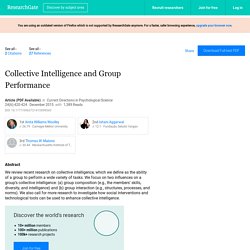
Paper presented at the 2015 Collective Intelligence Conference, Santa Clara, CA. Baron-Cohen, S., Wheelwright, S., Hill, J., Raste, Y., & Plumb, I. (2001). Version: A study with normal adults, and adults with Asperger syndrome or high-functioning autism. Child Psychology and Psychiatry and Allied Disciplines, 42, Chabris, C. Nisms of the law of general intelligence. (Ed.), Integrating the mind: Domain general versus domain specific processes in higher cognition (pp. 449–491). UK: Psychology Press. Deary, I. De Dreu, C. Tionship conflict, team performance, and team member sat- isfaction: A meta-analysis. Devine, D. Ter? Mance. Edmondson, A. (1999). Behavior in work teams. Ellis, A. J., & Moon, H. (2003). MOOCs no longer massive, still attract millions. The first ever MOOC I took had 160,000 people signed up for it.
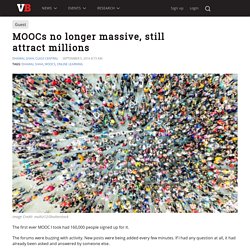
The forums were buzzing with activity. New posts were being added every few minutes. If I had any question at all, it had already been asked and answered by someone else. Prof. Jürgen Handke: "Digitales Lernen und Lehren - davor kann man sich nicht wegducken" Ein E-Learning-Pionier, ein Streiter für Digitales Lernen, ein Experte für die Digitale Lehre – das ist Jürgen Handke, Professor an der Universität Marburg.
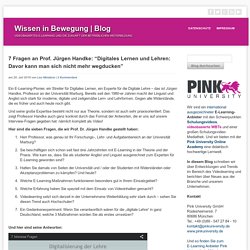
Bereits seit den 1980-er Jahren macht der Linguist und Anglist sich stark für moderne, digitale und zeitgemäße Lern- und Lehrformen. E-Learning Science Review (Quartal 1/2016) - WebCampus - E-Learning Komplettlösung. Externe Einflüsse beim Self-Regulated-Learning (SRL) Es wird belegt, dass externe Einflüsse effektiveres self-regulated learning (SRL) Training versprechen: Als externe Faktoren werden Gruppenbewusstsein („group awareness“) und Peer-Betreuung („peer assistance“) gewählt.
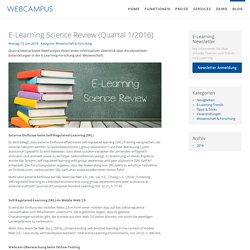
Bildungstechnologie I by Peter Baumgartner on Prezi. Datenreport2016.pdf;jsessionid 4BF838982B3B8F7230F25751EE783AF7. 978 3 938808 72 6. Konferenzbericht: Jahrestagung 2016 der Gesellschaft für Hochschulforschung in München. Die diesjährige Jahrestagung der Gesellschaft für Hochschulforschung (GfHf), die vom Bayerischen Staatsinstitut für Hochschulforschung und Hochschulplanung (IHF) vom 6. bis 8.
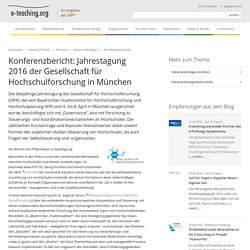
April in München ausgerichtet wurde, beschäftigte sich mit „Governance“, also mit Forschung zu Steuerungs- und Koordinationsmechanismen an Hochschulen. Die zahlreichen Kurzvorträge und Keynotes thematisierten dabei sowohl Formen der staatlichen (Außen-)Steuerung von Hochschulen, als auch Fragen der Selbststeuerung und -organisation. Ein Bericht von Philip Meyer, e-teaching.org. 50300814. 2016 nmc horizon report he DE. Can AI fix education? We asked Bill Gates. Vom LMS über MOOCs in die Cloud. Was leisten LMS zur Unterstützung von E-Learning an Hochschulen? Lernen mit digitalen Medien aus Studierendenperspektive. Im Podium wurden von Dr.
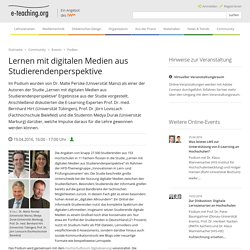
Malte Persike (Universität Mainz) als einer der Autoren der Studie „Lernen mit digitalen Medien aus Studierendenperspektive“ Ergebnisse aus der Studie vorgestellt. Anschließend diskutierten die E-Learning-Experten Prof. Dr. med. Bernhard Hirt (Universität Tübingen), Prof. Complexity and social learning. As we transition from a market to a network economy, complexity will increase due to our hyper-connectedness.
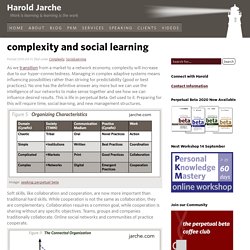
Managing in complex adaptive systems means influencing possibilities rather than striving for predictability (good or best practices). No one has the definitive answer any more but we can use the intelligence of our networks to make sense together and see how we can influence desired results. This is life in perpetual Beta. Get used to it. Preparing for this will require time, social learning, and new management structures.
Soft skills, like collaboration and cooperation, are now more important than traditional hard skills. Working cooperatively requires a different mindset than merely collaborating on a defined project. Cooperation, sharing with no direct benefit, is needed at work so that we can continuously develop emergent practices demanded by increased complexity. WEF New Vision for Education. Learning with me Mate: Analytics of Social Networks in Higher Educati… OER Atlas 2016 komplett. Landeskongress NRW "Bildung. Am 11.
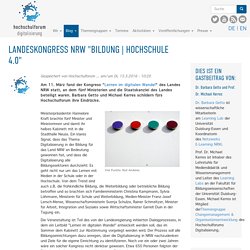
März fand der Kongress "Lernen im digitalen Wandel" des Landes NRW statt, an dem fünf Ministerien und die Staatskanzlei des Landes beteiligt waren. Barbara Getto und Michael Kerres schildern fürs Hochschulforum ihre Eindrücke. Vier Punkte. Null Anderes.Ministerpräsidentin Hannelore Kraft brachte fünf Minister und Ministerinnen und damit ihr halbes Kabinett mit in die Stadthalle Neuss.
Ein klares Signal, dass das Thema Digitalisierung in der Bildung für das Land NRW an Bedeutung gewonnen hat, und dass die Digitalisierung alle Bildungssektoren durchzieht: Es geht nicht nur um das Lernen mit Medien in der Schule oder in der Hochschule. Die Veranstaltung ist Teil des von der Landesregierung initiierten Dialogprozesses, in dem ein Leitbild "Lernen im digitalen Wandel" entwickelt werden soll, das im Sommer dem Kabinett zur Abstimmung vorgelegt werden wird.
Facebook. Hochschullehre 2.0. NRC01PL 07 - The MOOC Ecosystem. Making Sense of Blended Learning: Treasuring an Older Tradition or Finding a Better Future? Making Sense of Blended Learning: Treasuring an Older Tradition or Finding a Better Future Sir John Daniel, O.C.
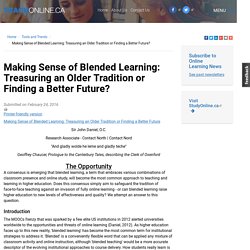
Research Associate - Contact North | Contact Nord. What’s Really to Blame for the Failures of Our Learning-Management Systems. Have you ever wondered why learning-management systems, which just about everyone on campus uses every day to keep classes running, seem destined to disappoint, year after year?
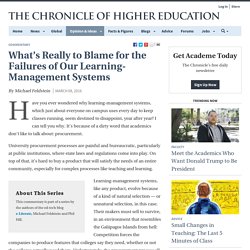
I can tell you why. It’s because of a dirty word that academics don’t like to talk about: procurement. University procurement processes are painful and bureaucratic, particularly at public institutions, where state laws and regulations come into play. On top of that, it’s hard to buy a product that will satisfy the needs of an entire community, especially for complex processes like teaching and learning. Der Digitale Wandel an den Hochschulen – eine Themaverfehlung? Wer in den letzten Jahren, heute oder in naher Zukunft, von einer Uni als Absolvent abgeht, ist kaum für die digitale Berufswelt gerüstet. Das ist fatal, denn wir haben ein digitales Leadership-Problem. // von Sebastian Haselbeck. The Development of Learner Self-Efficacy in MOOCs. News aus den Hochschulen. 10.03.2016: Diese Woche u.a. mit dem Lehrpreis der saarländischen Hochschulen, der neuen hessischen Digitalstrategie, einer Erklärung der Gesellschaft für Informatik zu digitalen Medien an Schulen sowie der Auszeichnung des edu-sharing-Netzwerks.
The corridor of uncertainty: Platform diversity in online learning. How many different platforms should you offer in an online course? Should everything be included under one roof in a learning management system (LMS) or can we offer a number of social media where discussions take place, leaving it up to the participants to decide which spaces in which they wish to be active?
Traditional e-learning favours the one-stop shop of the LMS (Moodle, Blackboard, Canvas etc) where one log-in gives you access to everything you need to complete the course. However we find that many participants prefer to discuss the course, for example in their own Facebook groups, rather than using the LMS discussion forum and to cater for this tendency many course providers offer a choice of arenas for interaction and collaboration. Most LMS now offer integration with social media to allow for platform diversity. This problem is highlighted in an article in eCampus News, Can social media enhance the MOOC experience? I did not use Twitter or Facebook. What Learning Will Look Like in 2035. We're living through a revolution in how human beings learn and develop. We're two decades into the 'anyone can learn anything' era and it's translating into big changes in formal education worldwide. Unbelievable progress will be made in the next two decades.
For example, my grandkids will be able to vote about the time that artificial intelligence becomes smarter than we are. Despite my optimism about learning innovations, no one can predict the future. Research & Writing A Learning Journey Curriculum for Cultural Diversity We started working in Australia in the late 1970s the new fields of English as a Second Language and multicultural education. We felt uncomfortable with the first wave of multicultural initiatives, which we believed to be tokenistic. We encountered a curriculum which remained substantially unchanged, despite the sprinkling of national day festivals and curriculum units which presented a tourist-postcard view of ‘other countries and cultures’. We thought this ‘spaghetti and polka’ approach to diversity amongst learners created as many new problems as it solved old ones. Rethinking Data: How to Create a Holistic View of Students.
The excerpt below is from “Hacking Education: 10 Quick Fixes For Every School,” by Mark Barnes and Jennifer Gonzalez. The following is from the chapter entitled, “Hack 10: The 360 Spreadsheet.” Collect a Different Kind of Student Data For at least a decade now, the driving force behind education reform has been data. We talk about collecting data, analyzing data, and making data-driven decisions.
All of this data can certainly be useful, helping us notice patterns we might not have seen without aggregating our numbers in some way, looking for gaps and dips and spikes, allowing us to figure out where we are strong and where we need help. And yet, we know this is not enough. In the spring of 2015, Denver elementary teacher Kyle Schwartz asked her students to complete this sentence in writing: “I wish my teacher knew . . . ” The student responses were so unexpected, so moving, Schwartz shared some of them online, igniting a movement that went viral within hours.
Learn Different. Seen from the outside, AltSchool Brooklyn, a private school that opened in Brooklyn Heights last fall, does not look like a traditional educational establishment. There is no playground attached, no crossing guard at the street corner, and no crowd of children blocking the sidewalk in the morning. Ful 07 2014. Pedagogy of MOOCs. Katholische Universität Eichstätt-Ingolstadt: Bildung und Univers(al)ität: Dimensionen der universitären Bildung. „Bildung“ ist ein zentrales Thema der Gegenwart. Aber was bedeutet Bildung eigentlich? In der Analyse des Begriffes „Bildung“ geht es letztlich um die Frage, welches Menschenbild dem Bildungsgedanken zu Grunde liegt. Digitale Lernszenarien - Gedankensplitter. Wie kann Ordnung in das Wirrwarr unterschiedlicher Unterrichtsmethoden gebracht werden? Im Jänner 2016 wurde mit dem Arbeitspapier „Digitale Lernszenarien im Hochschulbereich“ eine Systematik digitaler Lernformate vorgelegt. Das hat mich vor allem in Zusammenhang meiner eigenen „Taxonomie von Unterrichtsmethoden“ interessiert.
Auf die Idee einer kritischen Diskussion der „Ordnungsversuche“ im Lichte meiner eigenen Überlegungen hat mich der Blogbeitrag Lehre auf neuen Wegen von Jochen Robes gebracht. Darin bespricht er meinen gleich lautenden Bloghinweis, wo ich auf meinen aufgezeichneten Vortrag im Rahmen einer eDidaktik-Tagung an Universität Göttingen hingewiesen habe. Corporate Learning – Training und Wissensmanagement. Wo Kommunikation stattfindet, lässt sich Lernen kaum vermeiden. Soziale Medien und das Internet erweitern unsere kommunikativen Möglichkeiten enorm. Nicht nur zu anderen Experten, auch zu anderen Wissensquellen haben wir heute leichten Zugang. Experiences and best practices in and around MOOCs. National Education Technology Plan.
Der digitale Countdown - was er mit der Zukunft zu tun hat. Wir sind bequem. Uns geht es gut. Facebook Index shows Social Networking and Digital Divide in Germany. The Facebook Index (FBIX) provides an answer to the question: Is there an impact of broadband access availability on social participation in new media? This scientific indicator shows a digital gap between urban and rural areas and therefore between adequately and inadequately supplied internet users in Germany. For the calculation of the index, the number of Facebook users within a municipality is compared to the number of residents. Users without landline based broadband access are left behind within social networks. HFD AP Nr%2016 Grundlagentext Change Management.
Srdg-nrw_band03_big-data-und-medienbildung. Automation or empowerment: online learning at the crossroads. Gesammelt 8.1. – 15.1.2016, MOOCs und mehr. World’s most international universities: the student experience. For students looking for an international experience abroad or at home, Switzerland, Luxembourg, Hong Kong or even Qatar might be the best bet.
The Times Higher Education has released the world’s most international universities, and these countries are home to the five universities with the highest scores. Qatar University tops the table, while a quarter of the top 20 are in Switzerland, including École Polytechnique Fédérale de Lausanne and the University of Geneva, both in the top five. Ashley Pilipiszyn, a master’s student at the University of Geneva and originally from the US, said: “The transition from Chicago and Boston was not a difficult task. In the classroom, I was in a multicultural surrounding, connecting with students from different backgrounds, which enhances the overall academic experience.” Read more about Ashley’s experience in her blog. Forbes Welcome. Welcome. Moocs: international credit transfer system edges closer.
2016 eLearning Hype Curve Predictions. Innovating pedagogy 2015. Jean-piaget - Published Works. Democratizing education? Examining access and usage patterns in massive open online courses. Innovating pedagogy 2015. Die Chancen der Digitalisierung im Wissenschaftsbereich nutzen – Digitales Lernen fördern statt ignorieren. Massachusetts Institute of Technology to launch half MOOC, half in-person master's degree program. Handke 2015. Author discusses book analyzing massive open online courses from a social science perspective. Oct15. INTHEBLACK - Out-moocing the MOOCs: Traditional institutions fight back. MIT vergibt Leistungsnachweise für Online-Studien. Akademie für Potentialentfaltung. Course: eLectures. The role technology plays in the knowledge creation process. Aktuelle Studien rund ums Thema E-Learning (2015)